
so the auto industry bailout didn't get through congress. finally a little restraint from washington. although $14 billion in restraint is really nothing compared to $700 billion in non-restraint. though i would have liked the bill to have failed on lacking fiscal responsibility, i know it was pro-union backers that caused it to fail. the message i wished this sent was letting everyone know that the government is not here for handouts and the populace is not the benefactors of troubled companies.
the one part of the auto bailout that i supported was in saving the hundreds of thousands of direct jobs (and million indirect jobs) from being lost because of a few irresponsible executives. much like the financial bailout, the part of that i supported was not putting people out because of questionable actions by senior management. the many should not have to suffer for the sins of the few and such en masse failings are problematic. i have no problem with people losing their mortgages or jobs in the normal course of things, but when it happens instantaneously in such large quantities, then that impact is more than a ripple in the ocean.
what would have been a better option is not putting money back into businesses with inferior products, faulty decision making and legacy systems/contracts/obligations rather set aside a fund for the employees when the big three eventual file for bankruptcy. in all likelihood, the big three will, in some form, live on post-bankruptcy and those jobs will be available again. the bailout should be to support those unfortunate folks put out by incompetent companies and not prop up those companies.
yes it's socialist and i wouldn't call myself as such, but it's more logical than giving it to bad companies who've shown little responsibility in a storm brewing for decades. the fund would be run by some kind of trust designed to support auto worker families, providing them a stable and reasonable income (ie. not to the excessive levels of union wages) until the company they worked for is back up and running. the key is that in this eventuality, there are guarantees and the companies work toward operations again with the same employees in mind.
i liken the whole situation to a junkie. a bailout is just enabling them further. junkies need to hit rock bottom and staving off death with free money doesn't allow you to hit rock bottom, it's just another hit. junkies won't change until there is no other option and detroit won't change either if they are allowed to continue with their ways.
to me, bankruptcy is the only option. a controlled, assured bankruptcy (if there is one) is the only future that will make real change. this will allow them to shed management who have led these companies to their current state, foster more innovation, collapse the crippling unions, and repair their ailing bank accounts. sure, i make it sound simple, and i know it's not. but drastic measures, that doesn't include the term bailout, is just realism.
will this rejection force the bankruptcy issue or will it spur on a diametric shift in their thinking to turn it around? i don't know, but it needs to be extreme.
auto bailout bust
canadian undemocracy
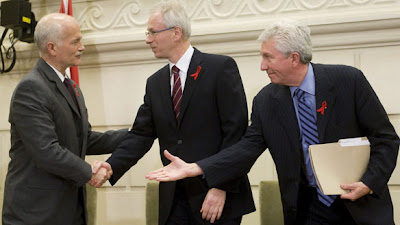
what i've born witness to in the past few days on parliament hill amounts to an all out assault on democracy. that's right, i said it. aren't the people supposed to decide the fate of a government in a democracy and not the government officials themselves? the powerplay that stephane dion, jack layton and whoever the leader of the irrelevant bloc quebecois party is, should be admonished for their actions.
in the last sham of an election, the people made a decision. there is no right or wrong one when it comes to government, it is simply the will of the populace. in it, they elected a conservative minority government, helmed by stephen harper. canadians made it very clear where the likes of the liberals, ndp and bloc quebecois stood, and it wasn't in power. the three musketeers are now telling all canadians that they were wrong in how they voted and it's their responsibility to make the right decision for them. there's something wrong in that.
i'm not siding with any party on this issue. i'm not saying who or what party or parties will be a better leadership for this country. i'm siding with the people and democracy. the people who spoke with their vote and are now facing that vote being overturned. with democracy that strictly lets the people decide the fate of our government. this is a coup d'etat thinly veiled behind a democratic banner. one where power hungry politicians are trying to use the system for their own gain and for their own perceptions of what is better for the country when it wasn't their place to decide.
if this was always their intention, which it seems it was, then they should have been upfront with voters during the election. now they are cheating those voters and subversing the democratic process we have in this country. i liken this whole situation to a child throwing a tantrum because they didn't get what they wanted. only it's three children in this case.
if the governor general has the final say in this matter, hopefully she has enough sense about her to dismiss this coalition. this is bad for the country and bad for democracy.
shiny new object syndrome in marketing

there's a phrase that has come to rise in the last while that goes like this: shiny new object syndrome. i don't know who coined it, but the saying started in tech circles, most notably the journalism side of things where writers rapidly move from covering one new thing to the next. they shower adoration upon a new gadget, or application and as quickly as they vociferously touted it, they would put it aside to bolster whatever was new, never really exploring in depth what any one thing in particular was capable of (features) or why people should use it (benefits).
shiny new object syndrome.
for the most part, SNOS has exhibited itself on the application front, specifically on the social media front. there's too many to count or keep track of that have fallen victim to this plague. the cycle goes that they launch, get a lot of media attention, there's some consumer uptake, and as quickly as they came to rise they seem to escape the popular consciousness. both media and consumers.
as of late, i'm seeing this model of adopting and disposing of things enter into the marketing world. of course it's due to the barrage of new media opportunities, web based or hardware based, that have entered the market in the last few years. and the malaise parallels that of the media coverage; we find them, we activate them, then we drop them.
all of us are to blame for this, myself included. we try to lead our consumers, or at least keep pace with them, so we jump to whatever they jump to. we as agencies make the recommendations and marketers themselves demand it. we keep aiming to be innovative and so we move on.
but there's one thing we forget - users don't stop what they started doing. they invest a lot of time and effort into their presence there. people haven't stopped using facebook, or myspace for that matter despite slowed growth and and plateaued usage. and think of how many people still have and use a hotmail account because that's the place they started. none of these are new anymore, but used just the same. in that regard, these are just as valuable places as all the shiny new ones. in fact, they may warrant more of our attention because they are proven (by still being alive) and our investment here would likely stand up. there's at least less risk our investment will be for not.
sure, there's the flash in the pan. we come charging out of the gate with that gets us noticed and some groundswell in our favor. but we have to also think of the longer life of the brand in these spaces. think about all the investment and all the equity you build into a property only to abandon it. consumers flock to us because of the value we provide. when we leave it fallow, we risk some consumer dissonance and in this powerful social age, it is too great a risk.
yes, there are temporary efforts that aren't sustainable. some efforts are in and out, but those need be efforts that are becoming of such an approach. but as it relates to the social media world and communities, there's no good reason why discontinuing efforts in this area is a good idea.
i'm not saying don't experiment. absolutely we should. it's about not abandoning what we start. seeing it through to it's real end. what that end is and when, i don't know. it just requires some thought about it rather than just dumping it. there's lots of great new things out there and there's room to give them a try, but where there is uptake and significance, keeping it up. we need to persevere to fully realize the potential of our presence in these spaces and get from our consumers what we desire.
p&g not sure about marketers in social media
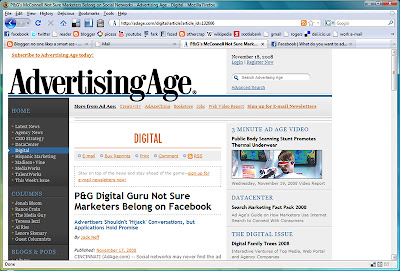
in today's AdAge, the general manager-interactive marketing at p&g, scott mcconnell, pontificated that brands don't belong in social media, pointing to the difficulty these sites have had in monetizing their spaces. a couple of his points i took objection to and thought that mcconnell was off on his basis.
the easiest way for me to assess this is to go through the article top to bottom.
what in heaven's name made you think you could monetize the real estate in which somebody is breaking up with their girlfriend?...
... they were trying to talk to somebody. so it just seems a bit arrogant. ... we hijack their own conversations, their own thoughts and feelings, and try to monetize it.
the basic premise that this space is for consumers to have conversations (namely breaking up with their girlfriend - which is dubious to start with) and that brands don't have a place in that kind of environment is erroneous. consumers are having conversations about brands, branded content (ie. commercials), and how brands fit in their lives. granted, this probably doesn't happen as much as we'd like, but gentle pushes and good reasons to want to talk about our brands i don't see as problematic. yes, the main thing about facebook is for consumers to interact with each other (talking, sharing, etc), but it's certainly not exclusionary to brands.
to say that we hijack their conversations is completely unfounded. in no way do brands become associated with the personal dialogue of people on facebook. the only conversations our presence and our media become associated with are those of the community doing something with the brand itself and that is completely legitimate to want to capitalize on and promote. and the news-feed stories those propagate do not take over user conversations, just add new ones.
so the targeting is fantastic. you can do really amazing things. but i'm not so sure i want to be targeted like that. ... i don't think everything every consumer says to someone else and writes down is somehow monetizable by the media industry.
it is folly to say that he doesn't want to see highly targeted ads and thusly imply that other consumers don't want to as well. increasing ad relevance is a much better scenario for consumers and one that i think they'd actually appreciate. why do i want to see feminine hygiene products as it's completely irrelevant to me? i will ignore it and be left with a negative feeling about a brand or media channel.
however, if an ad appeared that met a certain specific needs, or was of high interest to me, consumers would pay attention, be more likely to respond and have a better feeling about the brand as it fulfilled something missing in my life. at the end of the day, there is consumer acceptance to seeing the ads there because they get that in order for the space to be a free service, it has to be ad supported. so if they have to see something, it might as well be appropriate.
as for our right as marketers to tap into consumer conversations and interests to target ads, i would bet that p&g puts money in search. that more or less taps into people's interests to target ads to them or in gmail tapping into keywords within to serve relevant ads. what's the difference there than in facebook or other social media spaces.
mcconell went on to say that marketers should not abandon the space entirely, and that there are potentially valuable vehicles for advertisers such as applications. this is a somewhat outdated viewpoint as facebook has severely curtailed their visibility. you have to have something really powerful to break through the wall Facebook has put them behind (literally and figuratively). it's a huge challenge that only very few brands could hope to accomplish.
they held promise when they were launched and facebook took the wrong approach and that ruined applications. facebook let anyone and everyone make their own applications and didn't vet any of them or put a pay model in place to launch them. this completely ruined the space as it was flooded with useless and invasive applications and they had to correct it. that correction was the redesign and it devalued them significantly. so to believe that applications are the promised land is a hard pill to swallow.
all in all, i find the article and his viewpoints showed a lack of understanding about the value of the social media space and how brands in fact DO belong there. it's a fine line and marketers have to approach cautiously. but it's rich and valuable territory if they can get it right.
twittersquatting
remember in the early days of the web (crica 1995) opportunistic schemers would buy up url's in the hopes to cash in on other people's trademarks only to have a short boon before it got litigious and not worthwhile? looks like there are still some who think this model is viable to this day, just in different shapes.
when i was recently setting up my slingbox, i ran into some tech issues. having looked at their website and not finding a solution, i sought other channels, one being twitter. i followed a thought that since dell and comcast had a few customer service reps on twitter, maybe more companies were following suit.
so i searched twitter for 'slingbox' and came across this:
now people are squatting on twitter names, much like they did domain names. did no one learn? one nuance though to the whole thing that will prove this to be not as easy a task to ameliorate: twitter is a free service. the trail is a lot easier to follow when someone pays like they did with domains. it could also be argued that twitter assumes people's 'handles' or 'nicknames' which may not be seen as a trademark for the companies like a domain would be.
there's also the matter of whether companies care. twitter is still very small, and only has a cult following right now. no one knows how mainstream it will get. do companies feel that twitter is a valuable signpost that they need to defend their brands in? if so, where does it end? How many variations of their namesakes can they snatch up so others don't? i believe companies should protect their trademarks, but only up to a point. twitter is never going to be the destination point that a url would be. i believe twitter could be a valuable asset to a company, but there's many who likely don't feel that way.
i wish there was a simple reporting feature to twitter as this afront to intellectual property and branding sickened me. i hope twitter can suss these hacks out, and all like them. i did a few other searches to see what other companies are going to have to trot out their lawyers and slap these hacks with some kind of cease and desist order or shutdown their accounts.
here's a few examples of companies who are likely being squatted on (a random sampling of brand names i find as i peer around my immediate surroundings):
probable squatting
canon, linksys, chrysler, microsoft, adobe, apple, mcdonalds, warnermusic, ebay, coca cola, nike, budweiser, ikea, google, xm radio, vonage
definite squatting
playstation, xbox, samsung
tech splurge
i've been on a bit of tech splurge lately. doled out some cash, spending a lot of time setting these devices up and trying to figure out how they will all fit into my life. here's a rundown of the recent acquisitions. this is by no means a review at any level of comprehensiveness, just how technology is enabling me.
netbook - acer aspire one
quick specs: intel atom running @ 1.6GHz, 512mb ram, 8 gig ssd hard drive, 8.9" screen, runs on linux lite, wi-fi enabled, 3 usb, 2 sd card readers, 3 hr battery life, webcam and loaded with all the open source productivity software you need.
i really fell in love with this device from the first time i saw it. super portable, yet fully functional. it's right in the middle of my smartphone and a laptop. i can't be that productive on the smartphone given the screen size and slower typing and navigation, but at the same time, the laptop was still a bit cumbersome and more intensive than a casual situation warranted. with the netbook, i feel at ease going to a cafe to drink and surf, or take on the subway for a little pre-work work.
where does it fit: right now it's opening up more situations that i want screen time, but before was always a pain to do with the laptop. now i can go to bed with my wife and catch up on my google reader without a bulky laptop on my chest or a huge screen shining in her face.
slingbox tv tuner
as if i needed to watch more tv. i first saw this device about 2 years ago when i previewed it at a digital conference. my initial thoughts were this is great for ex-pats who want a taste of the tv they're missing back home or heavy travellers to watch programming they're used to. neither situation terribly applicable to me so i kind of dismissed it. then i got one as a gift and took an about-face.
what i've come to love most about this is the ability to share it with all my friends. for nothing, i can point people to a piece of software to install and give them my profile info. from there, they too can enjoy live tv on their computer from anywhere.
where does it fit: mainly as background right now, especially for low involvement programming and the great company that tv provides. though i have a laptop, i still prefer to be desk based and the orientation of my laptop at the desk is not facing the tv. so this allows me to have the tv still in the background but without all the constant head craning.
linksys WRT610N wireless router with storagelink
now having a wireless router is nothing new to me, but i had to get this one in particular to help me build an inexpensive network. the key to this router for me is the storagelink. it allows you to plug in a usb hard drive, creating a network drive that all your computers can access. so now all my music, movies, pictures, files, etc sits on this hard drive (and not slowing down my computer) and accessible anywhere. and by anywhere, i mean i can access it over the internet to so i have all my stuff, where ever i am, on any computer.
sure i could have bought a server for a few thousand, but this cost me $170 for the router and $100 for a 500gb usb drive and i still would have had to by the router with the server to get wi-fi. yes, it's also super fast operating at 5ghz for all kinds of multi-media activity without stuttering.
where it fits: mostly already said it above, i'm trying to go completely digital, and completely accessible. this delivers on that really well and really inexpensively.
smartphone - samsung blackjack II
gone is the relic of a flip phone that used to have. in it's place a glorious and robust little smartphone i call jack. using windows mobile, this has a suite of programs to be all kinds of productive, manage my time and contacts, and even play some games. oh, the internet access on a reasonably sized screen isn't too bad either.
where it fits: obviously texting is a key component as i do a lot of that. so a full qwerty keypad makes that a lot easier. with a very small data plan i can access facebook and twitter anywhere to keep in touch. but the biggest reason for me is to have an easy way of jotting down notes, ideas, compiling lists, and genrally keeping track of data snippets.
so it's probably pretty apparent at this point that i'm a media junkie. the sum of all these parts is i'm taking in more information than ever. while all this technology allows me unequivocal access and unlimited data, it's the humanity of knowing when to stop, both in discovering new stuff and generally when to have other things in life.
olympic attitudes

in the sporadic viewing and news reading on the olympics (can i write that? do i have the rights to?), it's become pretty clear to me the differences in the national pride exhibited by the nemesis nations of america and china that have emerged. it's subtle, but important.
china is a country on the brink. they've been shrouded in mystery for centuries and
they are trying to shed the negative images of communism, being a backward nation, oppression, poverty, and human rights abuses.
the u.s.a. is a nation built on pride. how they became a country, their unique democracy, their fight for autonomy, their treatsies on what it means to be an american and even a human, their personalities, and so much more has instilled within the country, and all it's citizenry, a national pride that is currently unmatched.
specifically on the olympics, it's pretty clear to me both nations approach.
china is trying to show the world up. they seem to be doing it less for the purity and power of sport and the excellence of themselves, but rather to show everyone that they are a power. to show that they can do everything any other country can, and better. that it isn't the athletes competing, it's china competing. the athletes are secondary to china exerting a kind of dominance, proving that the country belongs on every world stage.
the americans aren't doing it to establish their nation, they've already arrived. but even before they arrived, it wasn't about that. it was about themselves. not showing the world their greatness, but reinforcing in themselves they are great. american athletes do it for their country, and the people to bolster their own sense of pride. natuarlly this comes off as egotistical, but it's unintentional outward boastfulness. they do it for themselves, and sometimes that comes across as conceited to the world.
respect plays a large part in it. china appears to be demanding the respect while the u.s. is, and has always gone the route of earning it. athletes in both countries work just as hard but the impetus and goals are different. to china, it is a tool for them to exhibit perfection as one example of the country's ability to be THE world power. to the u.s., it harkens back to their roots. they wanted respect and fought hard for it, proved they deserved it (ie. american revolution).
i've definitely gotten the sense that to china, losing is not an option. imperfection is not an option. no one likes to lose or fail, but we are human and as alexander pope said "to err is human." although the athletes are the focus, but it's also everything else surrounding the olympics which china has controlled and contrived as a way of telling the world they belong. for me, having the mentality of using the olympics as an outlet for a superiority complex is a little misguided. in a way it's saber rattling. i'd go so far as to say they are like a baby throwing a tantrum in a pay-attention-to-me way.
how long is a piece of string?
i'm reminded about a quote a college instructor of mine used with some regularity. she would say "how long is a piece of string?" when discussing research and information gathering. it's stuck with me through the years. lately it's come to mind with regularity as i've been reading a lot of blogs and other site feeds (around 50 or so regularly) these days.
what i've found with blog reading is just how long that piece of string can be. the goal of this post is encourage you to follow that piece of string. wherever it leads, and however far off the original topic you were reading.
blogs are inherently social (duh) and in having that quality creates a richer experience for readers. social not only in the sense of who reads, shares, and contributes (formally or commenting) but also in how it incorporates other locales and information sources on the internet, and points to them.
traditional media sources, web 1.0 sites included, don't have this quality. with them, it's generally read article and you're done. it goes against their models to include links, that would only take people away from their site. besides, they are the only news source for you, right? you don't need to go anywhere else. it's not in their interest to send you away and it robs you of a deeper understanding of the information you seek.
so what's following the piece of string? well, here's a typical saturday morning where i set out to do some reading online. i open up my google reader and pick one of the blogs, and an article i want to read. then i click on all the links in that article that i want to go deeper in and open them as new tabs in the browser. then on each of those pages, i open up links found there. wash, rinse, repeat for as long as i want to follow that piece of string.
in the end, you end up with not just a deeper understanding of your original interest, but likely quite a bit more on many related topics. not to sound corny, but it can be an interesting and rewarding journey. your eyes could be opened to something new.
keep the gas prices high
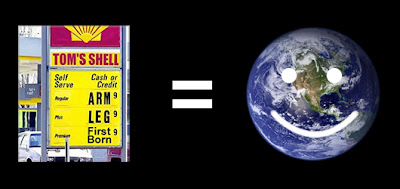
i'm going to go on record here and say that the rising gas prices are a good thing. of course not on our wallets, but as it pertains to the environment. what these high gas prices should be teaching us is to be more environmentally conscious not just in the interest of saving a buck.
here's a few positive areas where a high gas price is beneficial:
1) the immediate scaling back of gasoline usage
2) the increased pressure to find alternative power sources
3) greater composition of more fuel efficient cars on the road
of course, the one downside is the cost, but there's a positive spin there. it will only train people to be smarter about their consumption and will hopefully translate to better usage habits in the future for themselves and their children as they learn from their parents.
another outcome should be a correction in the supply/demand curve, or so economists would have us believe. meaning a temporary hard time where we push down demand but pay a high price should result in lowered prices as supply catches up. provided that we continue on with our ways that allowed this shift to happen, the prices of goods and services derived of and delivered by oil products will eventually fall. but can we as humans learn those lessons and keep on course?
in the spirit of full disclosure, i only use the car to play golf on weekends and pick up groceries here and there. so yes, it's easier for me to take this pov, but i can also look at it objectively. if i did drive more, i can guarantee that i would be much more conscientious about my driving. for one, i'm a cheap ass, so it would suit me to cut down.
i realize it's not a popular position to take, but everyone has to make sacrifices to turn this around. sure we'd like to put the onus on those with the financial means to do so, but change has to come from everywhere and everyone. to only force the wealthy to make sacrifices is a) not the largest cross section of the population therefore change will only go so far and b) we all are responsible so we all need to contribute to the solution. i understand it hits the poorest hardest, but if they get smarter too, then we all win.
i read an article recently in macleans talking about the woes of the airline industry, primarily as a result of rising gas prices. while i hate the notion of the impact the changes airlines are making and their impact if i wanted to travel, they are all necessary and smart means to achieve an environmental end.
similarly, we've already seen the impact on the auto industry, namely in the sales plummeting of larger vehicles. sadly it took up to this year for people to finally break and say $1.30/litre is too much and give up their gas chugging suv's and stop buying new ones. sure, i don't like people losing their jobs, but to turn the environmental ship around, it means we might have to go through some hard times. no one said it would be easy.
there is one flaw in all this, and that is the intent to save the environment is missing in most people. it's just a happy byproduct, if they even realize that. in respect of gas prices, people are out to save money first. that's the next step, getting people to realize that the behaviors that they will have to adopt to save money on gas are behaviors that they should use to save the environment.
cigarette companies are advertising again

in 1997, the tobacco act was passed in canada, regulating, in part, the 'promotion' of cigarettes through media vehicles. in section 22, the act stipulates guidelines by which tobacco companies can promote their products:
- in publications delivered directly to an identified adult through the mail, or that have known adult readership of not less than 85%
- in places where young people aren't permitted by law, such as bars
- by highlighting actual brand characteristics or by providing factual information about the characteristics, availability or price of the product
- use lifestyle advertising featuring glamor, recreation, excitement, vitality, risk or daring, or other associations that might appeal to young persons
- depict (in whole or in part) any tobacco product, or it's package or brand - or even any imagery that might evoke a product or brand
- sponsor youth oriented activities or events
- include the name of a tobacco product or manufacturer as part of the name of a permanent sports or cultural facility
i'd first seen these ads a few months ago, but wrote them off as anti-smoking ads by the government or some other agency dedicated to their elimination. you see, the ads were very simplistic and stripped down, nothing like the glory days of the marlboro man or joe camel. also, the ads seemed too generic and with such minimal branding, it looked to me like whoever was making the anti-smoking ads made the brand up because i don't know any of the cigarette brands featured (maybe because they aren't advertised and i don't smoke).
however, upon closer inspection, they are indeed cigarette ads. so far, i've noticed the ads in two magazines, and i feel the need to point out who they are: toronto life and time magazine. the reason i think they need pointing out (and if there were others, i'd point those out too) is a failing to their readership, and to their editorial dignity.
advertisements serve two purposes: 1)a revenue stream and 2)service and inform readers with appropriate and relevant ads. publications who run cigarette ads have failed their readers by doing so. they have sullied their pages to make money at the expense of their readership's health. their corporate citizenship is now staked on the irresponsibility of running advertisements for harmful products. in a time when pr means more than ever, magazines pandering to cigarette companies is a mistake waiting to be apologized for.
just because tobacco advertising isn't illegal, doesn't mean a magazine has to now run them. the law heavily restricted them in the first place with good reason. it was something everyone but cigarette manufacturers were behind and though we can advertise them, doesn't mean the underlying impetus behind it is lost or any less of a problem. a conscientious decision should be made factoring in all the negativity involved with no upside beyond revenue. but what does that translate to in your brand's perception?
shame on toronto life and other magazines who have accepted these ads to run. where is their moral compass pointing? are the readers better serviced because they can see cigarette ads? does this enhance their magazine and make it a better product? on the contrary. it points out that they are clearly on the side of making money above integrity, regardless of the source. are they that hard-up for money? they've survived for years without the tobacco revenue stream.
in the specific case of toronto life, who is supposed to be representative of this fair city and its denizens (albeit the upper class ones mainly), advertising cigarettes is in no way reflective of the community which has taken such severe measures to ban smoking to the level it has.
both magazines adhere to the 85% adult readership rule. still 15% (and likely higher) are kids and underage people who are going to be influenced by these ads. even if one started as a result, isn't that one too many? similarly with lapsed smokers, this doesn't help them stay smoke free. it only makes smoking seem more acceptable or legitimate since it's being advertised.
i realize the debate will always exist as to why cigarette ads are any different than say alcohol ads or fast food ones. it's a semi-valid stance if you ask me. while both those have their negative effects, they aren't unto themselves deadly (save for the few but very extreme cases where both used in such quantity and duration as to wreak havoc close to that of cigarettes). moderate intake of alcoholic beverages (namely wine, but beer as well) have proven to be beneficial and reasonable consumption of fast food is easily mitigated by activity and balanced diet otherwise. there is no mitigating cigarettes.
i don't want to lose sight that tobacco companies are any less in the wrong. after all, it was them who decided they wanted to start advertising again and whose money is fueling the morally inept decisions to run their ads. let us not forget the other culprit in this matter, the canadian government and provincial governments. for it is doing by not wholly banning cigarette advertising or cigarettes in general. again, money is at play as billions (nearly $7.1 billion in gov't fiscal year ending '06) are put into the government coffers from tobacco taxes. that's pretty substantial and i don't know how we would compensate for that otherwise, but the future medical needs of these people will certainly drain the government of more than the taxes levied on tobacco brought in. it's about making the tough and unpopular choices i guess.
i get that businesses exist to make money and magazines are no different. so where do we draw the line? is cigarettes that line? there is no upside to cigarettes. we wouldn't advertise and sell a cereal made of glass shards would we? i'd think a magazine would have a problem running that ad. what's the difference with cigarettes?
so what say you? have i taken an extreme moral high ground? is this not an issue?
no iPhones for you rogers

a techcrunch article came across my twitter feed today with breaking news that apple is pulling the new 3g iPhones from their canadian stores because of rogers' (the sole canadian carrier) outlandish data plans. good on you apple.
not only is apple the leading innovator in technology but now has assumed the role of policeman, fighting against inaccessible wireless bytes. someone has to do it, especially here in canada where our data packages are worse than 3rd world countries. i knew it was bad, but that's appalling.
to give my own perspective and why i care so much is i'm paying $11/month for 2 lousy megabytes of data transfer with rogers. this effectively leaves me with little to do outside of the few sites that have a mobile version that is low bandwidth intensive. and god forbid i go over my measly amount for the wrath of incremental bandwidth will leave my bank account in a sorry state.
there's a few good stories coming out of this whole situation.
1) that companies listen to consumers and take impactful action in response. apple listened to all the people who petitioned for lower wireless rates to make buying an iphone actually be worthwhile for the functionality your purchasing and not have to sell your first born to do so.
2) this should cause wireless rates, especially data ones, to go down significantly. rogers lost a huge opportunity to build a lot of goodwill and cache in the market by being the sole iPhone carrier. so one of to possible scenarios will hopefully happen: rogers will have to lower their rates to get the iPhone back which will cause the other carriers to lower their rates to compete or one of the other carriers gets the iPhone and the rates they will charge to accommodate apple will result in industry-wide rate decreases.
3) deregulation? will this spur the crtc to eliminate the current 3 company oligarchy and open up the industry for the sake of competition and fair prices for consumers? let's hope so.
i'm still dumbfounded by how profoundly rogers bungled this launch. the opportunity they lost was tremendous. someone is surely going to get fired for this. someone should anyway. while they've suffered a pr nightmare and the brand has some serious repair work to do, if they can reconcile with apple, there won't be much in the way financial repercussions. why? because apple devotees will take their product wherever they can get it, however soon they can get it so they will still flock to rogers. if they ever do get to launch it. maybe the only outcome is their exclusivity won't be a long, but they'll still have lots of iPhoners locked in by then.
as readers of this blog (are there any?) know, i'm no apple fan boy. i do respect the company for what they have carved out as product makers, innovators and marketers, but i'm not going to line up for their wares. probably won't ever buy any of them (i do own an ipod but it was a gift). that they have the power and clout to affect major industry players in other countries is impressive though.
update - july 9th, 2008
rogers succumbs to customer pressure and lowers their data rates. but in a half-assed way. it's only a promotion offered to those who sign up before august 31st. this gets you 6 gigs a month for $30 where before $30 got you only 300 megs.
i still call bullshit because it doesn't solve the problem apple was really trying to get at, that of standard rates being astronomical. it's a band-aid solution so rogers can save face. what about those who buy an iPhone after that date? they get royally screwed.
gadget glut
my intense anticipation for the new batman flick made me think how we're all becoming a little like batman. in what way, you ask? well, batman is known for his arsenal of crime fighting gadgets he totes around on his bat belt.
we too are becoming batman, only our growing array of gadgets are productivity, entertainment and communication ones. will the bat belt soon become a fashion necessity? the look has already started with the blackberry holsters so prevalent.
first off we have the gadgets themselves.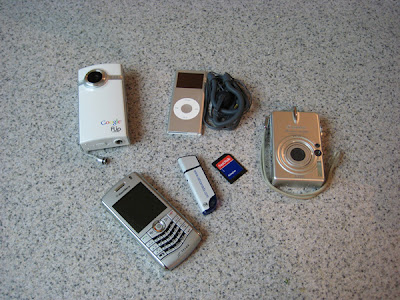
we have the phone, digital camera, ipod, earphones, video camera, usb key and sd memory card.
add to this the standard accouterments carried by all.
wallet, keys, change, sunglasses amongst other sundries.
all said, that's a lot of crap. for the most part this isn't a problem for women because they have their purses. and the purses in style these days being of luggage proportions can accommodate any number of devices and accessories without issue. but what options are available to us guys? short of a bat belt, how will all this be carried? fanny packs, man purse, cargo pants/shorts, shoulder bag, attache?
not all those options are either professional or very manly and some aren't practical. technology is supposed to make our lives easier, not more cumbersome.
as much as we've pushed technology forward to give us an all-in-one device (ie. smartphone) we still prefer the devices that service their niche area. not only that, smartphones are not within everyone's grasp. the camera on a smartphone doesn't offer us the same features and quality a regular digital camera does. while a smartphone can play music, our mp3 player gives us a better experience in sound, navigation and playability. smartphones are good, but not as good as we're accustomed to so they haven't fully replaced anything yet.
how do you carry your glut of gadgets? my vote is the shoulder bag, but a size larger that it can't be construed as a man purse. my general rule is that if it can hold legal paper, it isn't a purse. but that solves the problems on weekdays when i have a reason to lug that around. i don't have a good solution on weekends when i'm just out and about. i guess i just cram my pockets, but i feel a little to clunky when i do.
no more celebrity political endoresements
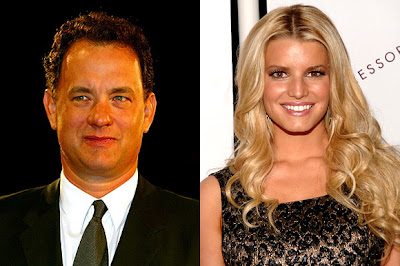
a rash of celebrities have, in the past weeks, lent their names to the assumed candidates of the u.s. presidential election. the issue boils down to whether a celebrity has a responsibility to be politically active given their stature, or is their endorsement an abuse of their star power. i stand here today to lodge my objection to this practice as i don't think it's good for the voting public.
What first got me thinking about this was a quote from tom hanks:
i want barack obama to be the next president of our country. as an official celebrity, i know my endorsement has just made your mind up for you.
now, that's a pretty pompous statement to make. i wondered where he got the notion that he is that important to america and the american political scene? unfortunately, this is the sad reality of our celebrity crazed society. celebrities can make these statements and the underlying truth is not lost.
to this, i also read a more grounded approach from pete sampras:
i don't personally (get involved in politics). it's not my place to tell you whom to vote for, to take and political stand, to tell you what religion to believe in. i'm an athlete. i can influence certain things, but when i see other athletes and celebrities telling you whom to vote for, i actually get a bit offended.
it's not his place, nor is it tom hanks' place to tell you which way you should vote. endorsements are part of the political game, only they should be left to the politicians. they're best qualified to make judgments on other politicians, because it's their field. it's not a celebrity's.
sure, some celebs have more credibility than others (george clooney) and others have even gone on to enter the political theatre (reagan, ah-nold). then their are people who have none whatsoever (jessica simpson). in either case, these people can't truly understand the ins and outs of the political game because they aren't in it. so they have little qualification to direct people which way to vote.
where celebrities should be involved with politics is simply to use their influence, appeal, and ability in commanding an audience to move people not toward any particular politician, but simply toward the democratic process and to vote. celebrities need to remain politically neutral and use their position to encourage involvement in the system, to push them to seek out for themselves the knowledge to make a decision and to vote their own way. not the way the celebrity sees it. celebrities are an awareness medium, not an influential one. that's right, celebrities are a medium.
using your star power to promote education is far more productive to the political realm of society than promoting who you want to vote for. incite intelligent discourse and information gathering rather than stifling it by presenting one option, theirs.
i wish it weren't so that celebrities wielded so much power and influence over the populace. it's sad commentary on our society and culture that they do. if only that power could be channeled for something that serves us and the process all better.
the problem is information and it's two fold: 1) too many people are uninformed or misinformed and 2) there is too much information out there in our media-centric world and digital age. both may very well lead to the conclusion that it is simply easier to rely on a celebrity to choose for you.
how does liking someone as a celebrity equate to you sharing the same political ideals as them, so far as to cast a vote inline with them? how can celebrities feel good about leveraging their influence this way? and how can we as people feel good about not thinking for ourselves? of all the people you align yourself with, surely celebrities, with all their wealth, fame, entitlement and stature are the furthest from our own perspective having none of those things in the quantities they do.
blogging just to be creative
chris brogan wrote a blog post today encouraging bloggers, podcasters, videographers, whatever that they should approach their content from the audience's mindset; namely, "what's in it for me?"
while i can accept that from a certain standpoint, i don't think it is universal. for many, the blog is a form of expression, much like an artist's painting, a musician's song or a director's movie. depending on your blog's objectives, the audience's role is different. the blog as art (a stretch?) is simply an outlet for the author's creative energy. the audience is secondary to simply expressing themselves.
painter's didn't paint for others (unless they were commissioned of course), but because there was a burning desire within them to do so. that was their talent, their skill, their passion, their outlet. same with creatives of all kinds. it's human to want to express ourselves, for ourselves.
the audience still gets something out of it, it's just not what drives the content. they get enjoyment, maybe some information or a viewpoint and conversations can happen around the piece, but the function is less about directly giving the audience something or making special efforts to accommodate that.
not that we should never give something back to the audience, but to make all our postings with that ideal doesn't seem entirely right. at the heart of blogging are people who are communicating their interests and passions, the audience comes later. so there is inherently something selfish about it. being creative seems like an okay kind of selfishness.
as chris himself states "we're wired to think as humans" with a "what's in it for me" attitude. the same must hold true for the producers as it is for the readers as we're all human.
the audience ultimately decides if there is something in it for them by choosing to return. there doesn't always need to be a key takeaway or a lesson learned or thought starter. there could be just a subjective, emotional response (ie. love it or hate it). both give the audience something, but different in its overtness and intent. especially if creativity was the impetus.
so i sign off with a question. do we as bloggers write to find an audience or do we write to an audience? do we write at an audience or for one?
time to cash in on your house?

tonight we took a stroll around our neighborhood with a waffle bowl of dairy queen. all along our path was 'for sale sign' after 'for sale' sign. people are still speculating as to what state the real estate market is in. i take this as a clear indicator.
what i extrapolate in all these 'for sale' signs is people seeing the market go into decline very shortly and are getting out at a high point. maybe not the highest point, but definitely before all the profits they've passed up in the last couple of years evaporate. a lot of this might be the particular neighborhood or the types of houses, but directionally, it's pointing to something.
many of the houses that had a 'for sale' sign where older bungalows. houses, that for a good deal, could be torn down to make way for a bigger house and greater return on the property itself. there were other types of houses as well, but i think that goes to show it's not just one type of seller looking to get out. that it is a trend everyone is trying to capitalize on.
so whether the market is actually in decline or if this is going to perpetuate the decline, the way i'm seeing it is on the way down. i like it that way. i can't stand to see such an over-inflated market, that is highly unsustainable, and will leave a lot of people with huge losses on their homes. i don't like a reality of having to pay prices it's going to be difficult to re-coop in the future when you sell. i'll take my property at a lower cost so that i can easily get my money back, even in a market valley.
try some retention
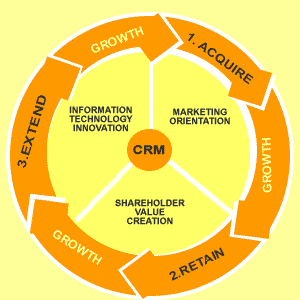
i'm not denying the importance of acquiring new customers as that equates to a higher baseline revenue stream for a company, but i've not understood why more efforts are not put against retaining existing customers. never are we made to feel more special to a company as the day we enter into their fold. after that, we're relegated to second class citizens, despite being the ones who fuel their ongoing revenues.
i will assume that there is some formula out there that asserts a new customer is more valuable than an existing one at the point of renewal. perhaps it's just as simple an equation for companies to say that we already got the existing customer's money, they're already invested in us and likely won't switch anyway, so who cares.
when you think about it, a new customer comes in and signs a contract much like an existing one would renew a contract. dollar value of the contract being equal, why is the importance on the acquisition and why is more effort made to seal that deal? take the case of the wireless category that spurred this post to life. in a situation where both a new and existing customer are signing up for the same three year contract, the plan fees and prospective monthly revenue to the company is identical. so why is it that the new customer gets their pick of all the phones, at significant discounts and other incentives to their monthly fees, yet the existing customer doesn't get all those phones to choose from and certainly not the discounts on them either, nor on the plan fees themselves?
we live in a what's-in-it-for-me society where incentives reign supreme. there isn't a lot of that on the side of customers renewing. however, continuing to be a new customer doesn't make a lot of sense either. sure there are some who wouldn't mind having a new phone number every 3 years, but for most, it's not a great option. same goes for other industries and services.
a company's approach to customers is universal; acquire them, and over the course of their term with you, maximize the revenue you can garner from each individual one. with this in mind, the customer should have the upper hand but you wouldn't know it. especially if the company has not yet recouped what they spent to acquire you. while it's not impossible to get comparable incentives to the new customer, you have to raise a stink to get it. this leaves the relationship contentious and opens the door to dissatisfaction and another company luring you away.
companies need to do more to keep their customers than send a direct mail piece every now and then, which ends up in the garbage anyway. we need to feel that we are valued by companies and for right or wrong, that often times comes down to when we're renewing. at that point when we have the opportunity to get out, it's not always apparent that a company wants us to stay. it's not enough to just thank us for the business as we hold our decision to stay in the same light as our decision to come to a company and that equation is heavily imbalanced.
multi-post #5: ken griffey jr, hillary clinton, jon lajoie
ken griffey jr. joins the 600 club
i will join in the chorus of merited applause and congratulations, for one of the most deserved athletes in reaching such a hallowed achievement in the game of baseball, to you ken griffey jr.
i like so many others having been waiting for griffey to reach this milestone for far too long. it wasn't that long ago that grif was ahead of hank aaron's pace for breaking the home run record, but then real tragedy struck in the form of a string of injuries that only merciless baseball gods could inflict on one of their brightest stars ever. i hated watching kgj's career getting derailed by injuries for over three years straight. it pained me to watch such a talent be sidelined by seemingly freak injuries. i hated watching a star, who was still in his prime, become forgotten and irrelevant. that he has been able to return to the game and still produce is a testament to his prowess.
griffey sits 163 homers shy of owning the home run record, something that at age 38 seems too far out of his grasp. bonds hit 149 in the 5 years after he was 38 and aaron hit 82, playing another 4 years after his 38th. with those benchmarks and griffey's already ravaged body and declining production, reclaiming the hr record for the side of dignity and honesty is a pipe dream.
i'm reminded of an article on the onion sometime last year entitled "... we wish it were you hitting 756 home runs." while it is a satire site, the sentiment is abundantly clear. i can't think of anyone better that baseball or the public in general (me especially) would rather have as their home run king. someone who has remained a pure talent and never once linked to steroids or cheating of any kind in his career.
hillary's presedential prophecy
now that hillary clinton has officially given up her bid for president, i'm reminded of a small bit, from a small show that a small part of me wanted to see the irony of it coming true. the show was TekWar anyone remember that one? it was william shatner's brainchild that lasted 3 seasons ('94-'96), focused around a crime unit that was trying to rid the world of an extremely addictive drug called tek. you see, there was a little bit in the background of one episode where a tv report was mentioning something about "... president hillary clinton..."
meant to be just a slight against the then first lady and her domineering way, who would have thought it could actually be a reality. but when you so poorly run a election campaign and drive it into the ground from such a dominating start, the irony of it all can't catch up to you. i don't know why that little bit of inconsequentia has stayed with me for about 14 years, but it was so outlandish, that it did. and now it's just as outlandish as it was before hillary clinton ran for office.
jon lajoie - canada's hidden comedic gem
i don't know how i stumbled upon jon lajoie, but am happy i did. i don't rave about too many people so effusively, but in this case, i was so smitten by jon lajoie's comedic mind that i had to. i think it's because he does what i am unable to do. i love to write extremely crass songs and sing them for people, but my ditties so pale to the genius of jon lajoie it's embarrassing.
case in point, this is the song that sold it for me. its' sublimely funny, clever and creepy. do yourself a big favor and hop on over to youtube to see his body of work. there are no misses.
a call for clemency to us duffers

i think us average joe duffers are a little too hard on ourselves. we don't shoot the score we want, we miss some putts, we don't hit the fairways, and we can't seem to stick our approach shots on the green. skill level or a factor of where we have to play? a combination of the two in my mind. i offer a modicum of relief we can all take to ease some of the pain in our shortcomings as golfers.
what i'm positing is that we don't have the luxuries pros do. sure, they have the problem of total yardage to worry about, but they have so much more terrain for forgiveness. look at what we usually have to play on. courses where the fairways are about as wide as a hallway and greens that have the diameter of a wading pool. contrast that with the broad expanses of a six lane highway for fairways and the lake sized span of greens the pga tour features.
okay, i exaggerate for effect, but it's pretty obvious. they have a lot more real estate to play on than we usually do. we are certainly not granted any forgiveness for even the slightest mishit to the left or right. not only is there more real estate to play on, but often times the way the golf course is laid out into the plot of land it has poses some interesting if not abnormal approaches.
not only just the width of the fairways or size of the greens, but general course conditions overall we unwittingly tolerate. i mean tee areas so hacked up you can't find even a small patch of grass for your tee. fairways that have been scorched by the sun so that they more closely resemble the cart path. greens that are a patchwork of barren areas and unrepaired divots. throw in the mix the usual proximity to a well-traveled road or train tracks to subvert our concentration and we falter more. let's not forget the caliber and nature of the other golfers we have to play alongside too. people who don't repair ball marks, cut huge swaths of turf out of the fairway, suddenly forget the word 'fore', and the bane of my particular existence, slow players and/or overcrowding.
this is no knock on any course in particular or the state of a lot of courses out there. a number of factors are at play, but primarily it's simple economics. your local course either didn't have that much land available to them or in order to service a certain part of the golfing population, kept the land smaller for less costs to pass along (land tax, maintenance, etc).
when we mis-hit a shot and it goes astray, we pay a far greater penalty than the pros. if we don't hit the fairway, we don't have a nice second cut of rough, it's right into the fescue or deep rough we contend with. no favors there to help us recover. if we non-pros hit a somewhat errant tee-shot, would that land us on the edges of a tour fairway as opposed to the rugged shoulders of the courses we normally play? does that approach shot land on the fringe or is it just a green in regulation on a tour stop with a long putt to follow?
let's also not forget that the pros have about 50 marshals and countless members of the gallery on every hole to help them find an errant shot or. i think most of us would appreciate even one person, other than our companions, who can be down the fairway watching every ball struck to locate its position. sometimes you think you know where it is, but mystifyingly it disappears.
i guess we could shell out the extra bucks for some much more well manicured courses that have more terrain, but golf is expensive enough and we all can't play at the top courses. some of us just like getting out there to hit a few balls or are more cost conscious. in some respects, it's as if you're paying for some measure of leniency from the golf gods when you play these swankier courses.
i think all this makes us better golfers though. forces us to play a tighter game. teaches us greater precision. instills in us a measure of humility. emboldens perseverance. golf is a game of momentum and confidence. how can we build either when we stand in the face of conditions that hold us back? rather than practicing good golf play, we are practicing our save shots or hitting a ball 8 inches above our feet. doesn't promote anything but frustration does it?
it frustrates us to no end that we are more acutely punished for the courses our lot in life grants us access to. the sport is frustrating enough as it is. that we can't always take the kinds of chances we want because the penalty is too high. i understand the game of golf is about penalizing us for the errors we make. but comparatively, the punishment is seemingly more severe for those who need the greatest alleviation and mercy from it.
i'd like to challenge the pros to take a shot at some of the local courses we play on and see how they fare. they may tear the course up, but they may also stumble on some of the idiosyncrasies of a course we blithely submit to every time we lace up the spikes. those drives that go a little astray and fringe-bound on the tour, are now in the woods. the approaches that are 30 feet from the pin are now a wedge shot for an up and down to the pros. i think it would be interesting, at least in a prove-me-wrong sense.
by no means am i saying that the pros have it easy. it's a career to them and they have a lot more at stake and a lot more that they have to put in to remain competitive. but that's not us weekenders. it's not our livelihood. we can't put in the time and money to play at that level, we have day jobs. i just think there is a big gap in what our skill level affords us and that required to play the courses we do.
so golfers, don't be so hard on yourselves. look at the conditions you have to play on, you're bound to err. take a deeper perspective of your golf game and say to yourself "yeah, i'm playing pretty good all things considered."
happy anniversary designated hitter

today marks the 35th anniversary of the dh rule in the american league. not an anniversary i particularly am pleased exists as i'm ardently against the the dh. this article over at si (itself and excerpt from the book 'change up: an oral history of 8 key events that shaped modern baseball) documents how it came about and the key players in the dh's inception. truth be told, i thought the dh as much older than 35 years and defined the difference between the american and national leagues a lot longer.
straight-up, without my own personal biases, i now understand how and why the dh came about. while i still don't agree with it, i know the purpose it did serve. i don't believe that purpose still exists, but the position (if you want to call it that) is too entrenched in the american league to go back now. you have teams that have for years based their whole system on the dh rule and they're just not going to relent on the matter.
to condense the history down, 1973 was a year dominated by pitching and the owners needed to make a change to balance the game more. and don't think it was purely about the sport being balanced either, their ledgers needed to balanced as well. see a pitching dominated league was less interesting than an offense dominated league, so revenues ebbed downward as people came to the ballparks less because it wasn't as exciting to watch. so the owners got together and instituted the dh, though not an original thought. the notion had been around since the early 1900's. and so on april 6th 1973, ron bloomberg (pictured above) of the yankees became a footnote in the annals of baseball as the first designated hitter.
my biggest beef with the dh is one of athleticism, both in symmetry and versatility. a baseball team should consist of 9 players who on the defensive end, take to the field to collect three outs and then offensively take turns batting. there is a completeness and tradition of players and teams who do this. in terms fo value to the team, a specialized player who can only bat really detracts from a team in a lot of situations where other skills are required. essentially, a dh takes the spot of a player who can provide more value to the team in situations outside of just hitting.
in reading this article, i found it interesting how the dh role has evolved over time. it started as a way to generate more offense and make the games more interesting. of course, this was still at a time where the fundamentalist approach of the game was still in fashion. that being get men on base, move them over and bring them home. that compared to the power game of today which has players thinking the long ball. so the dh of old would have been something i could be on board with. they were athletic type guys who drove in runs, got on base themselves, hit for a high average, and otherwise put up all-around decent numbers.
fast forward to today where designated hitters are all about power, with home runs being the key stat to mark a decent dh of today. that's only one facet of the game, and outside of fan excitement, one that has less on-field value than other stats. homers are still rarities (in perspective to other types of hits) so banking on that one long shot every so often isn't as good a return as a solid hitter, who when not clearing the bases those few times is contributing in other ways, like getting on base himself or moving other runners over.
as i will always do, there are points to support the dh, which i will share. it extends a players career, provided that they were a good batter. look at george brett or paul molitor, they got a couple extra years by moving over to dh. now tis point is only reserved for those players that can continue to perform at a high level at the plate. no one should extend a career if it is out of vanity or ego or something else if they aren't performing, so becoming a dh to extend your career better be for the right reasons.
proponents will also say it alleviates the demands on the pitcher as they are the only ones on the field who do as much constant and tiresome work. i'll give em that, but today's pitchers are a lot more coddled than in the past when they did have to bat. so perhaps they could toughen up some. besides, no one expects the pitcher to really do anything at the plate anyway, so get in there and take a couple swings.
to quote the movie bull durham, kevin costner's character says: "there should be a constitutional amendment outlawing astroturf and the designated hitter." i couldn't agree more. it's a hack rule that further babies half the pitchers.
multi-post #4: shortest story, earth hour
sometime in the 1920's, ernest hemingway bet some of his contemporaries that he could write a short story in just six words. he did so, and collected his proceeds from them. he considered it his best work. having read it, was truly impressed at just how much he was able to convey in so few words. that he did in fact tell an entire story, evoked emotion, words ebbed and flowed and took the reader on journey in the most mcluhanist way. here it is, unabridged:
"For sale: baby shoes, never worn."how i found out about this was through a recent article on wired where they approached 30 writers and 5 designers with the same task. the results mixed in my opinion. none really achieving the same essence as hemingway. while all good efforts and did capture each writer's own persona, they fell short in comparison.
here's my equally as feeble attempts at this exercise. i encourage anyone reading this to add their own in the comments for all to read.
"all computers gone. how to communicate?"
"brought a knife to gun fight"
"should've had sex before getting married"
"screeched to a halt. too late."
today at 8pm-9pm, the world is to shut off the power. a noble pursuit, no doubt, and one that i support for whatever small difference it makes. it's more about the world banding together than it is about the small effect of turning off your lights will have. please don't get me wrong in the words below, i'm not belittling this effort, I just think it could have been executed better or sent a stronger message.
the first issue is that this is being done on the weekend. granted, at least it IS being done, but for a greater impact, it should have been done on a weekday when more electricity is being consumed. i understand it's about getting the everyday citizen involved, but isn't it the corporations that are really driving global warming? also from the perspective of corporate involvement, it says a lot more to shut down operations and offices during the weekday than on the weekend.
secondly, don't limit it just to the lights. turn everything off. hell, i may just turn all the breakers off at the source, but at the very least, i won't limit myself to a few lights. i know a lot of people will go above and beyond, but in our minimal involvement society, people will do just that and still feel good about themselves.
third, government support needs to be escalated. citizens can do all they want but climate change is a largely political issue. it's about the government stepping in and enforcing regulations that will put a halt to these negative environmental shifts. the ontario government, who is supporting earth hour, and all other levels of government need to do more than this symbolic gesture of preserving our planet. i'll give credit to them for taking the step, but it needs to go further to actual legislation.
i'd also like to see more corporate involvement and more vocal support for earth hour. my friends at molson have gone the extra mile and declared that they will be shutting down all operations for the hour in a number of their facilities. very commendable and an example of taking this effort to heart and going above and beyond. i hope that more corporations are doing the same, but i'm skeptical that they will be. and if they are, that it is genuine and not just a pr play.
i guess baby steps is the m.o. on this one. we haven't been able to radically change people's perceptions or habits in this matter, so i guess we need to start small and build from there. here's to a happy earth hour, and to it being bigger in the future.
multi-post #3: rem, scaling the schedule, 10,000 bc,
r.e.m. is superserious about new music distribution
in an effort to maintain relevance and youngster cool, rem announced they will be releasing their next album, accelerate, on iLike six days before the official release date of april 1st. fans will be able to embed the band's tune's on their facebook, myspace and bebo pages through the ilike application (aka widget).
i don't mean to dog rem because i'm a big fan. but many claim them to be dinosaurs, no longer relevant to the mass music scene and past their prime, the best music behind them. i don't agree with all that, but the band is no longer on their top rung anymore. and who cares. i have a new perspective on the band having just completed their semi-authorized biography entitled fiction. it tells of a band interested in the art of music, not the celebrity of it. and however cliche it sounds, each album being an exploration into art and music that changes and never becomes homogeneous. and in that regard, they have been a success story, despite their waning sales and perceived misses. they make music they want to hear, not what the masses dictate.
back to the release of their new album, i do think the iLike effort is a ploy for more youth relevance. but i also believe that it is something rem want to explore. we're talking about a band who have been making music for nearly 30 years together, have witnessed and explored everything along the way from there. this technology is just one of the latest stops that curiosity has brought them to. this experiment follows in the footsteps of their seemingly successful dabbling with youtube and their website to give fans access to video content so they can make their own music video. see the gallery here.
the first single is a winner in my books. a great return to the hard edged rock and roll that made them famous. here's the video for supernatural superserious:
scaling the schedule
read an interesting article that seemed obvious, but teams are only now starting to realize it an implement it. for years the notion of 'scaling the house' has been in play. that the 'house' (ie. stadium, arena, park, stage, field, grounds, venue, etc.) charges different prices for seats depending on where they were. the closer, the more expensive. what is starting to take hold is the idea of not only doing that but also scaling the ticket pricing depending on who the opponent is.
inherently some of any given team's opponents are going to be bigger attractions than others. that is unless you are the yankees or red sox, in which case, you are the biggest attractions. those games are likely going to have a greater attendance, so why not charge more for them, thus increasing your revenue. people are going to see them even if the tickets cost a little more. why should those yankees and sox be the only one to capitalize on their fan base and status? conversely, cheaper tickets for lesser teams might encourage greater attendance, and thus greater revenues.
being an ardent baseball fan and regular attendee of the blue jays games, i see this every year when the yanks or sox come to town. it's almost guaranteed that attendance will be double. in many cases their fans outnumber the home team's. as an owner, i'd love that revenue increase. it could do wonders for the team in better players or better fan experience (or just likely the bottom line). my gut tells me that people are willing to pay the premium and will do so because, well, they're fans and they want to see who they like. living in the most expensive hockey city, i see all the time people will to pay top dollar to see their mediocre team play anyone else.
some independent firm analyzed the numbers and came to the conclusion that there is a windfall to be had in doing this. i'd gladly take a greater sum of money from all the new yorkers who cross the border to come watch their precious yankees and use it against them by way of better players. i think it will help sports become more competitive and smaller market teams be able to thrive.
10,000 bc (big crappy)
i had the good fortune of seeing 10,000 bc last week at an advanced screening. i say good fortune only in the sense that the tickets were free and that the movie was only an hour and a half. otherwise, misfortune abounded. i went in thinking "oh this might be an okay movie. see some dudes battle saber-tooth tigers, kill mammoths and fight over territory in an epic, prehistoric way." what i got was puzzling.
it's a love story! that's right, a love story. the entire movie is about a man chasing after a kidnapped woman. there's not even a good battle scene. most startling of all is the complete and utter neglection of historical fact. i'm all for being entertained, but there are some things i just can't overlook. sure, with sci-fi i can chalk up any disbelief to the fact it's science fiction and that is license to do what you want. but a period piece, you can't ignore the facts and history. let me recount the most grievous liberties they took:
1) complex language - the people spoke english, and good english at that. i'll give that up to making it accessible and english representing whatever language they did speak. but wait, was language around then, or was it grunts and gestures? i can't easily answer that, but can't assume that there was that much of a language around at that time. even more, the vocabulary they used was sizable. if they had words, there weren't that many.
2) forged weapons - the dominant race/tribe in the movie who did all the pilaging brandished swords. i can say with most certainty, that humans were incapable of fashioning weapons like this at that time. in a similar wein, these poeple also tamed horses which i think is quite the stretch too
3) building technology - the aforementioned dominant race/tribe was building a friggin pyramid. that is easily 7,000 years prior to the pyramids that actually exist in egypt. they also used technology and means of creating them that we are still speculating if the egyptians even had so many years later.
the movie could have been so much more, so much better. instead it was a colossal failure. there's a formula for these types of moveis, and the producers didn't bother following it. that may sound like propogating the same aold crap, but it's not. each retelling of a similar storyline has new twists. in this case, it's the prehistoric setting and the cool beasts that lived at the time.
tax time again

as always this time of year, filing your taxes. wish it could be simpler? it could be. as i started my preparation, i remembered an article i read about a flat tax that the fraser institute had put a news release out on. by no means is this a new idea, i just wasn't aware of it until now. but it seemed pretty compelling.
the reader's digest condensed recap of all this is we are currently operating under a progressive tax system where different income levels are taxed at different rates. with this of course are all the shelters, loopholes, deductions, and exemptions that make actual payment of taxes perhaps less mandatory. a flat tax is exactly that, an equalized tax that applies to everyone regardless of their income level. there's a lot more to the theory and to the practice of flat tax, but i'll leave that to wikipedia.
what the fraser institute proposed was a 15% tax across the board with an exemption altogether for the lowest income earners. the tax form itself would be the size of a postcard and have about 10 inputs. that's it. no complicated forms, no receipts, no h&r block, fuss whatsoever. quite an appealing proposition for the layman. beyond the new ease of filing, they also mention a savings of roughly $30 billion in costs to maintain the current tax system and cite the economic benefits seem to be a huge boon as well. to quote the fraser release:
One of the most significant changes under the proposed flat tax is the full exemption of savings and investment from taxation. Income put back into the economy in the form of savings or investments would not be taxed under the flat tax, which would encourage more savings and investment and lead to a more vibrant and wealthier economy. The changes would also make Canada much more attractive and competitive internationally.
the greatest appeal for me is that under this system, the government will make the same amount of money, but in a much less complicated way. the other big appeal is that my tax rate would lessen from what it is now. and as the fraser institute states, more money for me to spend and put back into the economy. but aside from myself, i like that the people who traditionally weasel out of paying taxes, the highest income earners, no longer can avoid paying what they should. so no longer does the middle class bear the burden of funding this country, we all do equally.
the next question is, will this come to fruition? will someone in parliament or yet to be elected take this to the house? i can't imagine a mass populace will not want this to be a reality. if we live in a democracy and we are all supposed to be equals, at least on one level, a flat tax will make us all equals.
multi-post #2: nader, weiner circle, kfc, kimmel's f'ing ben affleck
ralph nader opts to run for president... again
today ralph nader announced that he would again run for president as an independent. i commend ralphy for continuing on with his quest even though he must know to himself that it is futile. he is a serious candidate who really wants to make a difference and embraces democracy and the idea that there should be other alternatives to the stagnation of a two party system. but ultimately it is a fools errand.
this will mark nader's fifth attempt at the white house, and i would guess his last. the guy is 74 after all. his most memorable run would surely have been in 200 where he is widely regarded as tipping the scales in favor of george w. bush against al gore. nader's 2.74% of the popular vote would largely have gone to gore this ensuring his election. but alas, that was not to be.
of course the next 8 years of running the country into the ground could not have been fully seen at the time. nader was simply exercising his rights as a citizen. there is nothing wrong with that. at least there was some real political intent as opposed to all the other pseud-candidates who clutter up the ballot every year with no real desire for the job. i don't know yet (nor does anyone i imagine) exactly what role nader will have this year. with the party battles still so up in the air, it's hard to tell what impact he will have. i will venture to say though that the presidential election won't be as close as it was 8 years ago so nader's paltry number of votes likely won't swing it either way.
wiener circle hamburgers
just read an article in macleans about a new burger joint called the weiner circle in chicago. an interesting concept to say the least. basically go in and get berated by the staff while you wait for your order. sure you can jab back, but, it's literally these people's jobs, so prepare to be taken down. i can see why it's a tourist attraction, it looks like a real experience. it's admirable for the people behind this counter to be able to take it like they do. especially with all the shitheads out there who take this too far. but when you open the door to this type of activity, you will bring out the worst in people, without fail. the people who filmed this shouldn't have blurred out the faces of the more ignorant and offensive idiots who take what is supposed to be meant as fun and turn it into something vicious and derogatory. they should be exposed like those rv riding jackasses in borat. if you say it, especially when there's cameras around, you should be held accountable for it.
kentucky fried salmonella
while w're on the subject of questionable service, let me tell you the story of what is now my last experience at kfc (not a lifetime ban, but indefinitely for sure). a friend and i opted to hit the kfc for a quick bite. i opted for the big crunch as it is much less nauseating than getting a couple pieces of original recipe. you feel bad, but not as bad. we both asked for no mayo. as we stood by the counter witnessing the exceptionally slow service, we watched as the assembler bring out the large 'mayo dispenser' (ie caulking gun) and splurt out a generous dollup of mayo on each of our sandwiches. so as the slid the tray to us, we slid it back noting the non-absence of mayo and prepared to wait another eon.
of course they didn't have more than one already pre-made in a warmer, so my friend who ordered first got his while i continued to wait, assured that it would be 6 minutes. as the rest of my food got cold, i waited. finally the new sandwich was put in my hands and i walked to the table. i took a bite, chewed, swallowed, none the wiser. as i looked down to take the next bite, the sight of raw chicken confronted me.
now angrier, i marched ot the counter and threw down sandwich and launched into a tirade making sure eveyrone heard me. some highlights include:
- "this is fucking raw."
- "i want my money back, i'm not paying for this shit."
- "are you trying to fucking kill me?"
none of them would make eye contact and each puttered about trying feabily to rectify the situation. with the combo costing $6.99 + tax, i was only given $7 back but was so flabbergasted, that i didn't debate it. the hardest part was keeping a straight face as i could hear my friend laughing loudly at the scene i was creating. they offered to also replace my meal at no charge as if i still wanted to eat anything else they peddled. i walked back to my seat to finish the rest of my meal.
then someone brought me my replacement and made another insinscere apology. i said to my friend "i bet this has mayo on it." sure enough, as i opened it, mayo was everywhere. now completely incensed, i ate my remaining fries, picked up the sandwich and on my way out the door, pitched the mayo-laden thing against the wall where we were sitting, completely fed up.
now, everyone has a job to do, some more difficult than others. there is a reason that fast food joint employees make what they do, because it isn't rocket science. they have one task, to cook food properly. stick it in a fryer for the perscribed amount of time and serve it. simple, right? one key difference is when I screw up in my job, i don't make people violently ill or kill them. if i screwed up in my job, i'd get fired, but not these chumps. it likely won't even be remembered a week from now. fortunately i didn't get ill, but i won't be back there anytime soon.
jimmy kimmel gets back at his girlfriend
if you haven'te seen these already, you really should. there is actually some good stuff on late night tv. shocking i know.
here's the first from sarah silverman. i wasn't a fan of her show. i thought it was kinda dumb and unfunny. her standup was okay, but nothing impressive. but this is comedic gold.
and here's jimmy's response. while he directly rips off silverman, his execution was on a much grander scale and that is where this is comedic gold as well. i hope there is an unedited version of this somewhere, because there's a lot of bleeps
multi-post #1: castro, shreddies, hitman hangers & mario paint
in an effort to blog a bit more, i'm going to introduce a new style that is less long form and more a couple of things that i encounter, pique my interest or have a relatively strong bent toward writing about but none that warrant a full post unto itself. so i give you the multi-post blog. i'll still do the dedicated posts, but i find those harder to compose regularly.
fidel castro steps down
upon hearing that castro was stepping down as the leader of cuba, and reading some stories about it, i was immediately confused. i heard words like parlaiment, and legislature. we are talking about the same dictatorial, communist regime right? a quick stroll through the cuban government section on wikipedia confirms an enigmatic political structure that seems nothing more than a thin coat of pseudo-democratic paint over tyranny.
but man can castro rock the hell out of a track suit at political functions
diamond shreddies... for real?
has everyone seen the new ad campaign for diamond shreddies? the word audacity comes to mind. i'm well aware that post has their tongue planted firmly in their cheek on this one, but it does take some gall to invest that much money in a piece of faux news and to splash it across that many advertising channels. while it's kind of scratch-your-head funny, the risk to me is consumer perception of the brand veering toward "this is stupid." vs. "ha ha ha, that's kinda funny and clever."
better endings
on the weekend we saw another tale of hitmen called 'in bruges', the week prior having seen 'no country for old men.' while both were okay movies, both suffered from an unsatisfying ending. i won't spoil either, but they were sopranos-like in that there was no finality to either picture. i don't get this style of film making where the audience is left wanting more and will never get it. neither will have a sequel, and neither warrant one. so why can't the movie makers give us an actual ending that, as movie-goers, we require to complete our experience? and "in the sake of art" isn't a good enough excuse. movies are meant to give you a story and stories have endings. otherwise it's just an unformed thought and negates the existance of the picture altogether. why tell a story with no outcome?
mario paint mixer
anyone remember mario paint on the snes? probably not. not many people had it much less played it. i did though. it was a really basic proagram where you could draw 8 bit pictures that could have vitually no detail, make animations of no more than 8 frames and make music of 100 beats or less using the sounds from the mario games to date. well apparently there is a bit of renaissance around the music maker. i came across a number of youtube videos of people making popular songs using it. someone ported it to the pc and made a little program out of it that you can find here. as with any extremely limited and archaic form of production, i commend those who are able to recreate any semblence of the real thing with these bits of computer generated sound.
not really a contest slam dunk contest
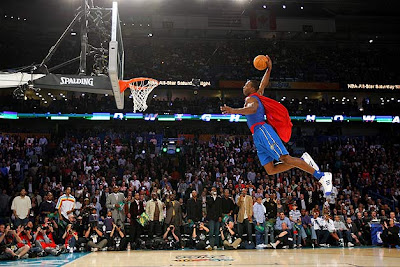
can a man win the dunk contest when he doesn't actually dunk? it would seem so. this dunk was nothing special, save for the outfit, but that's just a gimmick. it was impressive though to see superman here literally throw the ball through the hoop from about 2-3 feet from the rim. this wasn't even his best dunk on the night. that was his tap off the glass alley-oop for a power slam. but he could have done anything and still won this competition. the other no name, second stringers didn't stand a chance with their uninventive dunks. there hasn't been such a rout of the other contestants since vince carter strung together the single greatest line-up of dunks ever in 2000.
three card poking

ah the three card poker. the current mainstay of my time in a casino. it's quite a simple game for those that don't know it (basic game play here and here) and pretty fun to play. it's not as serious as poker tables have become and not quite the work that blackjack has evolved to.
let me explain a bit of the gameplay so i can relate my experience at the table. there are three ways to play. the first is pairs plus where you only get paid when you hit a pair or higher hand (see table below). the second is ante & play where you ante-up before seeing the cards and pay an equivalent amount after seeing your cards to continue playing them. the third way is to play both obviously.
Pair Plus Payout
| Hand | Payout | Likelihood |
| Straight Flush | 40-1 | 0.22% |
| 3 of a kind | 25-1 | 0.24% |
| Straight | 6-1 | 3.26% |
| Flush | 4-1 | 4.96% |
| Pair | 1-1 | 16.94% |
there's no doubt that the money is to be had by playing pairs plus. i can't debate that. there could be some big payouts in there. but it is also the place where you can lose the most money. if you're just playing the ante & play route, then your payout is 1-1 on both the ante and play bets if you beat the dealer and 1-1 on just the ante bet if the dealer doesn't play. there's no big money in there. not immediately anyway.
when i sat down at the table, my tactic was to just do the ante & play route. take the long road, or be the tortoise as it were. the minute i sat down and only put a bet on the ante and not pairs plus everyone at the table and the dealer questioned it out loud to me. this happened each of the 5 times i sat down to play. it's funny that they're all trained to do this because it's the biggest cash grab.
the dealer knows the casino makes tons of money on pairs plus losses so is more or less encouraging me to do it. and the other players are blinded by the potential for that one big payout that's bound to happen and would kick themselves if they weren't playing for it and it did. just look at the probabilities of you actually hitting a pairs plus hand. it's crazy to continue to throw money at the pairs plus for that faint chance of chasing a high hand. does it happen? of course it does, randomness always comes around to hit the most improbable. but what is the cost to get there? i think it would be interesting to track a players pairs plus losses compared to the wins to illustrate this, but i'm almost certain of which side it favors.
so each time i was asked, i responded with "i have a system" and quietly went about my business. while my stack shrunk and grew like the rest of the players (mostly the latter when it's all said and done because it is a casino after all), it went down in half the time. i happily forewent playing the pairs plus (except on a few hands where i felt lucky and sometimes it paid out) thus eliminating a whole bet while all the other players made twice as many bets each hand. the payouts they did get only served to make the time the chips were theirs a little less than half the time i had my chips.
i guess though there are a couple schools of thought on how to approach gambling:
1) as entertainment
2) as a dream (the big payout)
3) to make money
4) as a rite
5) as an addiction
my own personal approach is as entertainment. the way i see it, i want to be there for a while, soak up the experience, talk to people, ride the highs and lows and generally have a good time. if i lose, so what. i compare it to a night out on the town where i could easily spend just as much for little more in return. i'm also a bit of a #3 as i'm competitive and want to win. anyone walking tot he table with a 'system' wants to, or even expects to come away on top.
but you see all of the first 4 and hope not to see a fiver. i saw people who continued to throw money at the table hoping for that one hand which would (in their mind anyway) erase all the money they've thrown at it before. then there were those #4's who just put money down hand after hand, and big sums each bet. it wasn't a far cry to see $75 down on pairs plus and another $75 down on the ante every hand. these people were just betting for the sake of betting for when they won, there was no emotion or satisfaction. they kept getting wiped out and forked over more notes for chips.
so the question is, did i win? i did win, then came back to lose. my first trip i walked in with $100 and left with $300 in about 30 minutes of work. not a bad take. should have stopped there. but that's what gambling is good at, bringing you back. and so i did. the next visit i lost the $100 i took in. still up $100 overall. next visit i walked out $50 richer. up $150 overall. next visit i blew the $150 in winnings accumulated to that point. so now i was even. then in the final visit i lost $100, thus finishing me off in the red.
i expected to lose money going in. it's acceptable. i'm there for the experience. it was a good ratio of experience for money. why didn't i stop after my first visit? who would? you have free money at that point to gamble with. the allure of more riches from money you earned gambling that if you lose doesn't mean you actually lost anything you had coming in. yes, knowing when to stop is important, but it's your expectations and knowing when to stop to match those.
about me
 travis st.denis
travis st.denistoronto, canada
 linkedin profile
linkedin profile facebook profile
facebook profile youtube profile
youtube profile pic a day blog
pic a day blogcross-media planning guy with a bent toward digital and social media.
twitterings
currently reading
 Past Mortem by Ben Elton: Written in typical Ben Elton style, full of wit, shock, poignancy and suspense you'd expect from past books. With old friends like these, who needs enemies? It's a question that short, mild-mannered detective Edward Newson is forced to ask himself, having, in romantic desperation, logged on to the Friends Reunited website in search of the girlfriends of his youth. Newson is not the only member of the class of '86 who's been raking the ashes of the past. As his old class begins to reassemble in cyberspace, the years slip away and old feuds and passions burn hot once more. Meanwhile, back in the present, Newson's life is no less complicated. He is secretly in love with Natasha, his lovely but very attached sergeant, while comprehensively failing to solve a series of baffling and peculiarly gruesome murders. A school reunion is planned, and as history begins to repeat itself, the past crashes headlong into the present. Neither will ever be the same again.
Past Mortem by Ben Elton: Written in typical Ben Elton style, full of wit, shock, poignancy and suspense you'd expect from past books. With old friends like these, who needs enemies? It's a question that short, mild-mannered detective Edward Newson is forced to ask himself, having, in romantic desperation, logged on to the Friends Reunited website in search of the girlfriends of his youth. Newson is not the only member of the class of '86 who's been raking the ashes of the past. As his old class begins to reassemble in cyberspace, the years slip away and old feuds and passions burn hot once more. Meanwhile, back in the present, Newson's life is no less complicated. He is secretly in love with Natasha, his lovely but very attached sergeant, while comprehensively failing to solve a series of baffling and peculiarly gruesome murders. A school reunion is planned, and as history begins to repeat itself, the past crashes headlong into the present. Neither will ever be the same again.
delicious links
subscribe/follow
Labels
- 10000 bc (1)
- 24 (2)
- acer (1)
- acer aspire one (1)
- acquisition (1)
- action figures (1)
- ad age (1)
- ads (1)
- advertising (10)
- ae tv (1)
- airlines (1)
- alex rodriguez (1)
- apple (2)
- auto industry (1)
- bailout (1)
- baseball (4)
- basketball (1)
- batman (1)
- blackjack (1)
- bloc quebecois (1)
- blog (1)
- blogging (1)
- blogs (1)
- blue jays (1)
- blunt (1)
- bong (1)
- branded content (1)
- branding (1)
- british wankers (1)
- brokeback mountain (1)
- business books (1)
- canada (2)
- canadian breast cancer foundation (1)
- case studies (1)
- casino (1)
- cd's (1)
- celebrities (1)
- celebrity political endorsements (1)
- china (1)
- chris brogan (1)
- christmas (1)
- chrysler (1)
- cigarettes (1)
- coalition (1)
- coke (1)
- communications (1)
- community (1)
- condo (1)
- conservatives (1)
- consumers (1)
- contextual targeting (1)
- costs (1)
- creativity (1)
- credit score (1)
- crtc (1)
- customization (1)
- d30 (1)
- dapper (1)
- data plans (1)
- david armano (1)
- designated hitter (1)
- dh (1)
- digital camera (1)
- digital music (1)
- dope (1)
- dwight howard (1)
- e-ink (1)
- earth hour (1)
- electronic music (1)
- endorsements (1)
- engagement (1)
- environment (1)
- espn (1)
- facebook (5)
- facebook pages (1)
- fatty (1)
- fidel castro (1)
- flat tax (1)
- flip video (2)
- ford (1)
- friendfeed (1)
- future of newspapers (1)
- gadgets (1)
- ganja (1)
- gas prices (1)
- global warming (1)
- gm (1)
- golf (1)
- google (3)
- google wave (1)
- government (1)
- guitar hero (1)
- hashtag (1)
- hemingway (1)
- henry rollins (1)
- high (1)
- hillary clinton (1)
- house lights (1)
- houses (1)
- iab (1)
- in bruges (1)
- innovation (2)
- internet (1)
- inventions (1)
- iowa caucus (1)
- ip tv (1)
- iPhone (2)
- ipod (1)
- jack bauer (1)
- jack layton (1)
- jimmy kimmel (1)
- jon lajoie (1)
- keifer sutherland (1)
- ken griffey jr. (1)
- kfc (2)
- kindle (1)
- laurie mcguiness (1)
- lego star wars (1)
- liberals (1)
- linksys (1)
- los angeles lakers (1)
- mac (1)
- mac versus pc (1)
- marijuana (1)
- mario paint (1)
- mark zuckerberg (2)
- marketing (4)
- marketing funnel (1)
- marketing hourglass (1)
- mary-jane (1)
- mesh conference (1)
- microsoft (1)
- mitchell report (1)
- mlb (3)
- molson (1)
- mp3 (1)
- multi-post (3)
- nba (1)
- ndp (1)
- netbook (1)
- new england patriots (1)
- new years (1)
- newspapers (1)
- nfl (1)
- night terrors (1)
- nintendo wii (2)
- no country for old men (1)
- odds (1)
- olympics (1)
- online ads (3)
- online video (3)
- ontario (1)
- oprah (1)
- parking wars (1)
- parlaiment (1)
- pavor nocturnus (1)
- pc (1)
- persistence (1)
- pet insurance (1)
- pga (1)
- phil jackson (1)
- picperdiem (1)
- playoffs (1)
- polititcs (1)
- post season (1)
- president (1)
- presidential race (2)
- primaries (1)
- procter and gamble (1)
- product placement (1)
- pure digital technologies (1)
- rabbit (1)
- ralph nader (1)
- rayman's raving rabbids (1)
- real estate (1)
- recession (1)
- reefer (1)
- relevance (1)
- rem (1)
- resolutions (1)
- retention (1)
- robots (1)
- rock music (1)
- rogers (1)
- running up the score (1)
- sarah silverman (1)
- scam (1)
- scott rolen (1)
- search (1)
- season 7 (1)
- seating prices (1)
- semantic web (1)
- server (1)
- shiny new object syndrome (1)
- short story (1)
- shorttail media (1)
- shreddies (1)
- sideburns (1)
- slam dunk competition (1)
- sleep disorder (1)
- slingbox (1)
- smartphone (1)
- social ads (1)
- social media (7)
- speeding (1)
- spliff (1)
- squatting (1)
- star wars (1)
- stephane dion (1)
- stephen harper (1)
- stoned (1)
- storage (1)
- strike (1)
- super nintendo (1)
- superbowl (1)
- targeting (1)
- taxes (1)
- technology (1)
- tekwar (1)
- television (3)
- tetley tea (1)
- thinking visually (1)
- three card poker (1)
- time magazine (2)
- tmnt (1)
- tobacco companies (1)
- tom brady (1)
- torontolife magazine (1)
- trade (1)
- trans-siberian orchestra (1)
- troy glaus (1)
- twitter (4)
- u.s.a. (1)
- unions (1)
- vet (1)
- voting (1)
- web 2.0 (1)
- weed (1)
- weiner circle burgers (1)
- what's in it for me (1)
- wi-fi (1)
- wireless (3)
- wireless router (1)
- world series (1)
- writer's guild (1)
- youtube (1)



